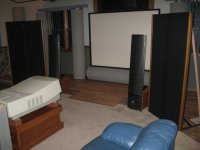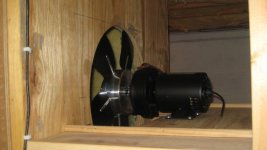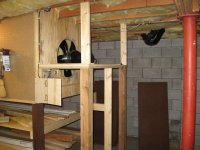g,day all
i have some brand new ml request panels and am wanting to use them for a project
im thinking of making some frames the same as the ml cls and then incorporating some subs into the mix
the original request crosses to its bass driver at 125hz so this would be my min crossover setting
my questions are
1/ what style of sub would blend best ,im thinking ib ?
2/ can i get away with just subs or will i have to run some mid bass drivers in between the panels and subs ?
also i already have 4x beta 15" bass drivers if these would be any use
thanks in advance for any help/advice
cheers
i have some brand new ml request panels and am wanting to use them for a project
im thinking of making some frames the same as the ml cls and then incorporating some subs into the mix
the original request crosses to its bass driver at 125hz so this would be my min crossover setting
my questions are
1/ what style of sub would blend best ,im thinking ib ?
2/ can i get away with just subs or will i have to run some mid bass drivers in between the panels and subs ?
also i already have 4x beta 15" bass drivers if these would be any use
thanks in advance for any help/advice
cheers
Whatever woofers you add must play cleanly for at least one octave above the crossover frequency and most subs are too heavy and slow to play that high cleanly. I think you would need a small woofer (10" max) to bridge the gap. Also, if you cross the panels over that low, you would want to use a very steep crossover slope, not less than 24db/oct and 48 would be better still--- that way, you get the woofer out of the midrange.
If you keep the Qts of the woofer system lowish you'll likely get the "fast" sound to match the ESLs... although that's not always going to work... To get to 125hz you can use any size driver, pretty much. Getting the woofer OUT of the picture is harder to do, and that's "advanced" xover territory. But the suggestion just made to go high slope is not a bad one... The DF of the amp running the woofer will also play a role.
Box designs that use horns, ports, bandpass etc can be problematic in as much as there is a propagation delay between the ESL and the secondary woofer output (like a BP box or port). How much of an issue that is depends on a number of factors including how low in freq it appears and how often you hear it in the music... so many folks have decided on the sealed box as a result.
With the sealed box, the tendency is to try to keep the box small, so that implies EQ added, and then again you need to consider the Qts of the woofer system, the F3 point you want to achieve and IF you use EQ on the bottom remember that the Qts is equal to the effect of the EQ upon the inherent Qts, not just the Qts of the woofer in the box! It's the final filter (curve).
But yeah, it can work fine. No midbass drivers required if ur at 125Hz.
Bottom line, try it, "if it sounds good, it is good". (Count Basie said that)
_-_-bear
Box designs that use horns, ports, bandpass etc can be problematic in as much as there is a propagation delay between the ESL and the secondary woofer output (like a BP box or port). How much of an issue that is depends on a number of factors including how low in freq it appears and how often you hear it in the music... so many folks have decided on the sealed box as a result.
With the sealed box, the tendency is to try to keep the box small, so that implies EQ added, and then again you need to consider the Qts of the woofer system, the F3 point you want to achieve and IF you use EQ on the bottom remember that the Qts is equal to the effect of the EQ upon the inherent Qts, not just the Qts of the woofer in the box! It's the final filter (curve).
But yeah, it can work fine. No midbass drivers required if ur at 125Hz.
Bottom line, try it, "if it sounds good, it is good". (Count Basie said that)
_-_-bear
Stay away from sealed enclosures, they will never mate well with a dipole panel, best is with rear firing ports.
g,day
thanks for the help so far guys , heaps to think about
the design of the request is sealed ,low q and 12" and the ones i have heard work very well (to my taste) so i think that crossing to good 15" s would be fine as its only 2" bigger than what ml chose to use
i,m pretty keen on infinite baffle subs ,what do you guys think of these combined with esl ,or as an alternative maybe ob using the 15" eminence betas i have ?
cheers sheafer
thanks for the help so far guys , heaps to think about
the design of the request is sealed ,low q and 12" and the ones i have heard work very well (to my taste) so i think that crossing to good 15" s would be fine as its only 2" bigger than what ml chose to use
i,m pretty keen on infinite baffle subs ,what do you guys think of these combined with esl ,or as an alternative maybe ob using the 15" eminence betas i have ?
cheers sheafer
well you can see the "best" on my website... but that's only imho. 😀
IB is fine, as long as it is IB... which then leaves the question where will you place them... if they are not in the proper place WRT the main panels the time difference will create a problem.
_-_-bear
IB is fine, as long as it is IB... which then leaves the question where will you place them... if they are not in the proper place WRT the main panels the time difference will create a problem.
_-_-bear
Hi,
A bass (i.e. any LS) may be represented in a first approximation by an analogy to an electrical filter. As with any filter the higher its order, i.e the steeper its flanks, the worse the response in the time domain.
Low order filters (1st and 2nd order -->6dB-12dB/oct) would be the best in this regard. Open baffle/dipoles, followed by closed boxes represent this class.
BassReflex, Transmissionline, Bandpass (3rd to 6th order --> 18-36dB/oct) etc. are of higher order since their functioning relies on resonator effects.
Their only advantage is increased efficiency, which we mostly don´t need with ESLs. If we need it, multiples of the low-order case would be the way to go. Multiple dipoles or CBs can offer additional advantages as described in a couple of other threads in DIY-Audio.
jauu
Calvin
Thats not backed up, neither by theory nor praxis. Ported systems increase group delay and spoil transient response. Provided that ported means some kind of cabinet with dedicated ports and not any open-baffle/frame that also may radiate sounds to the backside.Stay away from sealed enclosures, they will never mate well with a dipole panel, best is with rear firing ports.
A bass (i.e. any LS) may be represented in a first approximation by an analogy to an electrical filter. As with any filter the higher its order, i.e the steeper its flanks, the worse the response in the time domain.
Low order filters (1st and 2nd order -->6dB-12dB/oct) would be the best in this regard. Open baffle/dipoles, followed by closed boxes represent this class.
BassReflex, Transmissionline, Bandpass (3rd to 6th order --> 18-36dB/oct) etc. are of higher order since their functioning relies on resonator effects.
Their only advantage is increased efficiency, which we mostly don´t need with ESLs. If we need it, multiples of the low-order case would be the way to go. Multiple dipoles or CBs can offer additional advantages as described in a couple of other threads in DIY-Audio.
jauu
Calvin
Last edited:
Some interesting solutions:
Dipole Woofer
Gradient: SW-S & SW-D
(Gradient: SW-63 & HE Crossover
Gradient: SW-57 subwoofer)
Dipole Woofer
Gradient: SW-S & SW-D
(Gradient: SW-63 & HE Crossover
Gradient: SW-57 subwoofer)
The ability to adjust frequency, phase and volume is very important in your crossover network, to 'dial-in' the final integration between woofers and panels. I'm using a cheapo Dayton 10" self-powered woofer with my Acoustats (crossed-over at about 80 Hz), but it took me literally months of knob-twiddling on the built-in crossover to get the integration as seamless as I wanted. I found the position of the phase control to be particularly important.
Food for thought:
THE AUDIO ANNEX - View topic - Subwoofer as a statement piece in the room

In my opinion:
1. Seal bass is better tan ported, even for M/L stats.
2. Crossover going into the 500hz midrange is fine, adds some meat to the bones to the normally light or thin stat sound.
The original M/L Aerius did both these things, and I still like it over it's larger more expensive brothers.
One person has mated M/L stats (by-passed the woofers) to older larger Magnepan tympani panels which provide the bass. I do think they are on the right track.
THE AUDIO ANNEX - View topic - Subwoofer as a statement piece in the room

Not for everyone, but this huge dual 12" tapped horn from Danley Sound Labs rocks my home theater. It is veneered in Macassar ebony.
In my opinion:
1. Seal bass is better tan ported, even for M/L stats.
2. Crossover going into the 500hz midrange is fine, adds some meat to the bones to the normally light or thin stat sound.
The original M/L Aerius did both these things, and I still like it over it's larger more expensive brothers.
One person has mated M/L stats (by-passed the woofers) to older larger Magnepan tympani panels which provide the bass. I do think they are on the right track.
Last edited:
Pretty room!
Pretty gear!
Imo, way way way too live (reflective) for my listening tastes...
As far as a tapped horn - I'd be concerned about the delay time between it and the ESLs...
_-_-bear
Pretty gear!
Imo, way way way too live (reflective) for my listening tastes...
As far as a tapped horn - I'd be concerned about the delay time between it and the ESLs...
_-_-bear
1. From what I can see in the picture, that beautiful room (and with pretty gear too) must be very echo'y. Hard to imagine me making speakers sound tolerable to me in that room, not least the MLs, to my ears.... I hope I have expressed my personal opinion of my personal taste in a manner which is consistent with forum standards of courtesy and respect for the fact that others may have very different personal tastes.
2. On motorcycle forums, we have a joke about anybody starting one more dreaded, interminable, inconclusive, and evidence-free thread about motor oils. That's not to say choice of motor oils isn't important but at some point, nobody has anything new to say on the topic. Correct me if I am wrong.
2. On motorcycle forums, we have a joke about anybody starting one more dreaded, interminable, inconclusive, and evidence-free thread about motor oils. That's not to say choice of motor oils isn't important but at some point, nobody has anything new to say on the topic. Correct me if I am wrong.
Last edited:
The photo is of "Wardsweb" room, he posts in many audio forums, including this one I think.
He builds some of his own equipment, a very talented person. I'm not sure that that photo represents the last word in room acoustic treatments. Maybe he changed it since the photo was taken.
He builds some of his own equipment, a very talented person. I'm not sure that that photo represents the last word in room acoustic treatments. Maybe he changed it since the photo was taken.
electrostatic, Magneplanar and rotary woofer
This is my system with Martin Logan Summits (woofers disconnected) along side of Magneplanar Tympani IV bass
panels (modified) with Eminent Technology Trw-17 Rotary
subwoofer.
Food for thought:
THE AUDIO ANNEX - View topic - Subwoofer as a statement piece in the room

In my opinion:
1. Seal bass is better tan ported, even for M/L stats.
2. Crossover going into the 500hz midrange is fine, adds some meat to the bones to the normally light or thin stat sound.
The original M/L Aerius did both these things, and I still like it over it's larger more expensive brothers.
One person has mated M/L stats (by-passed the woofers) to older larger Magnepan tympani panels which provide the bass. I do think they are on the right track.
This is my system with Martin Logan Summits (woofers disconnected) along side of Magneplanar Tympani IV bass
panels (modified) with Eminent Technology Trw-17 Rotary
subwoofer.
Attachments
- Status
- Not open for further replies.
- Home
- Loudspeakers
- Planars & Exotics
- subs for esl panels


